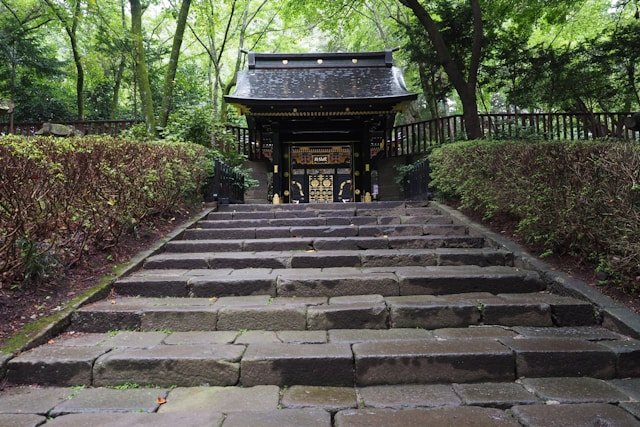SENDAI
CITY OF TREES

Sendai, the capital of Miyagi Prefecture, is the largest city in Japan’s Tohoku region, often dubbed the “City of Trees” for its lush greenery and tree-lined streets. Founded in 1600 by the legendary feudal lord Date Masamune, this vibrant metropolis blends a rich samurai history with modern urban life. With a population of over one million, it serves as a cultural and economic hub, offering everything from historical landmarks to bustling shopping districts. Its compact layout makes it easy to explore, whether you’re strolling through downtown arcades or venturing out to nearby natural wonders like Matsushima Bay, one of Japan’s three most scenic views.
It helps keep this site running, and we appreciate your support!
Sightseeing
Zuihoden
Zuihoden is the dazzling mausoleum of Date Masamune, Sendai’s founder, tucked into a forested hillside. Its vibrant wooden carvings and Momoyama-style architecture scream opulence, housing not just Masamune but his son and grandson, too. The cedar-lined path up feels like a step back in time, and autumn’s fiery foliage makes it even more stunning. There’s a small museum on-site with clan relics, perfect for history nerds.
Sendai Castle Ruins
Perched on Aobayama hill, the Sendai Castle ruins offer more than just remnants—think panoramic city views and a bronze statue of Masamune on horseback, gazing out like the boss he was. No castle stands today (thanks, WWII), but the stone walls and a reconstructed watchtower hint at its past glory. The Aoba Castle Exhibition Hall nearby dives into its story with artifacts and a 3D model.
Matsushima Bay
A 30-minute train ride from Sendai, Matsushima Bay is a jaw-dropping stretch of pine-clad islets—one of Japan’s top three scenic views. Sightseeing cruises weave through the 260-odd islands, or you can wander along the shore to spots like Zuiganji Temple, a National Treasure with intricate cedar interiors. The salty breeze and serene vibes make it a perfect escape.
Jozenji-dori Avenue
This tree-lined street in downtown Sendai is a visual treat, with zelkova trees arching overhead and bronze sculptures dotting the path. It’s especially magical during the Pageant of Starlight in December, when 600,000 lights turn it into a winter wonderland. Year-round, it’s a chill spot for a walk, with cafes and the Sendai Mediatheque—a sleek library—close by.
Sendai Daikannon
Looming 100 meters tall, this massive statue of the Goddess of Mercy watches over Sendai’s suburbs. You can climb inside to see Buddhist statues and a top-floor lookout with killer views. Built in 1991 for the city’s centennial, it’s a 30-minute bus ride from downtown but worth it for the sheer scale and quirky spiritual vibe.
Activities
Walking Tours
These guided walks dig into Sendai’s soul, from Date Masamune’s haunts to hidden downtown gems. Knowledgeable guides spill stories about the city’s samurai roots and modern quirks, often hitting spots like Zuihoden or Jozenji-dori. They’re customizable, too—opt for a half-day stroll or a deeper dive, perfect for soaking up local vibes on foot.
Rail Tours
These tours whisk you from Sendai to nearby treasures like Matsushima or Yamadera Temple via scenic train rides. You’ll get a mix of history, nature, and photo ops—like Matsushima’s island-dotted bay or Yamadera’s cliffside serenity—all wrapped in a day trip. It’s hassle-free, with transport and sometimes a guide included.
Nikka Whisky Sendai Factory Tour
This distillery visit in Sakunami is a hit for booze buffs. You’ll tour the Miyagikyo facility, learning how pristine water and peat craft their whisky, capped with a free tasting. The lush setting near waterfalls adds charm, and it’s an easy bus ride from Sendai—great for a half-day outing.
Flights
When booking a flight to Sendai, timing is key to balancing cost and experience. Spring (March to May) brings cherry blossoms and mild weather, but it’s also peak season, so expect higher fares and busier airports—book at least two months in advance to snag decent deals. Autumn (September to November) offers cooler temperatures and stunning foliage, with slightly lower prices than spring, though festival dates like the Tanabata in August can spike demand. Winter (December to February) is the cheapest time to fly, with fewer tourists and occasional snow adding a serene vibe, but check for holiday surcharges around New Year’s. Sendai Airport (SDJ) connects directly to Tokyo, Osaka, and several Asian cities, so compare domestic and international options based on your starting point.
Hotels
Nestled in the heart of Aoba Ward, this hotel puts you steps away from Sendai Station, making it a dream for travelers relying on public transport. The rooms are sleek and modern, with free WiFi, air conditioning, and flat-screen TVs, plus a kettle for that morning tea fix. A 24-hour front desk handles luggage storage, and the on-site restaurant serves up a breakfast buffet with local flavors—perfect fuel for a day out. You’re a short walk from the bustling Ichibancho shopping arcade and a quick bus ride to the Sendai Castle ruins, where Date Masamune’s legacy looms large. The nearby AER building’s observation deck offers sweeping city views, too.
Tucked into the lively Aoba district, this spot combines comfort with convenience, offering air-conditioned rooms with private bathrooms, desks, and fridges—ideal for unwinding after exploring. The shared lounge is a cozy hangout, and the 24-hour staff can swap currencies if you’re fresh off an international flight. It’s practically next door to the Sendai City Community Support Center and a 15-minute train ride to the Sendai City Museum, packed with Date clan artifacts. Jozenji-dori Avenue, with its iconic zelkova trees and sculptures, is a leisurely stroll away, perfect for an evening walk.
This hotel in central Sendai boasts a bar with city vistas, making it a standout for those who love a nightcap with a view. Rooms come with free WiFi, kettles, and flat-screen TVs, while the non-smoking policy keeps things fresh. It’s just 700 meters from Sendai Station, so you’re well-connected, and a short hop to Rakuten Seimei Park Miyagi for a baseball game or a casual picnic. The Sendai International Centre is nearby for a dose of culture, and the surrounding Aoba Ward brims with cafes and shops to explore.
Set in the Aoba Ward, this place brings a touch of relaxation with its natural hot spring baths—a rare treat in the city. The rooms are minimalist yet comfy, featuring free WiFi, air conditioning, and private bathrooms with all the essentials. English- and Japanese-speaking staff keep things smooth at the 24-hour desk. You’re 300 meters from the Sendai City Community Support Center and an easy walk to Sendai Station, linking you to day trips like Matsushima. The nearby Zuihoden Mausoleum, Date Masamune’s ornate resting place, is a must-see history spot.
Perched near Sendai Station’s east exit, this hotel offers direct access to the transport hub, a fitness center, and a shared lounge for downtime. Rooms are equipped with desks, safes, and fridges, plus free WiFi to keep you connected. The breakfast buffet highlights local ingredients, and vending machines handle late-night cravings. It’s a 15-minute train ride to the Sendai Museum and close to the Sendai Uminomori Aquarium in the recreation district, great for a family outing. The surrounding area teems with eateries and convenience stores, too.
Dining
Sendai’s signature dish, gyutan, is charcoal-grilled beef tongue that’s juicy, tender, and a little smoky. Born post-WWII as a creative use of scraps, it’s now a local obsession, served with rice and oxtail soup at spots near Sendai Station. The texture’s like steak but lighter—don’t knock it ‘til you try it.
This sweet treat pairs sticky mochi rice cakes with a vibrant green paste of mashed edamame and sugar. It’s a refreshing, earthy dessert, especially chilled in summer, and a Tohoku specialty. You’ll find it in cafes or stalls around Ichibancho, often with a side of tea to balance the sweetness.
A fish cake shaped like bamboo leaves, sasa kamaboko is a savory bite made from ground white fish, steamed or grilled for a subtle, bouncy texture. It’s a coastal Miyagi classic, often sold fresh at markets or paired with sake in izakayas. Look for it near the Asaichi morning market.
Tips
Value Index
Sights like the castle ruins and Jozenji-dori are free, though Matsushima cruises or distillery tours add $10-$20. Compared to Tokyo’s pricier bustle, Sendai delivers rich experiences without breaking the bank, though luxury seekers might find options limited.
